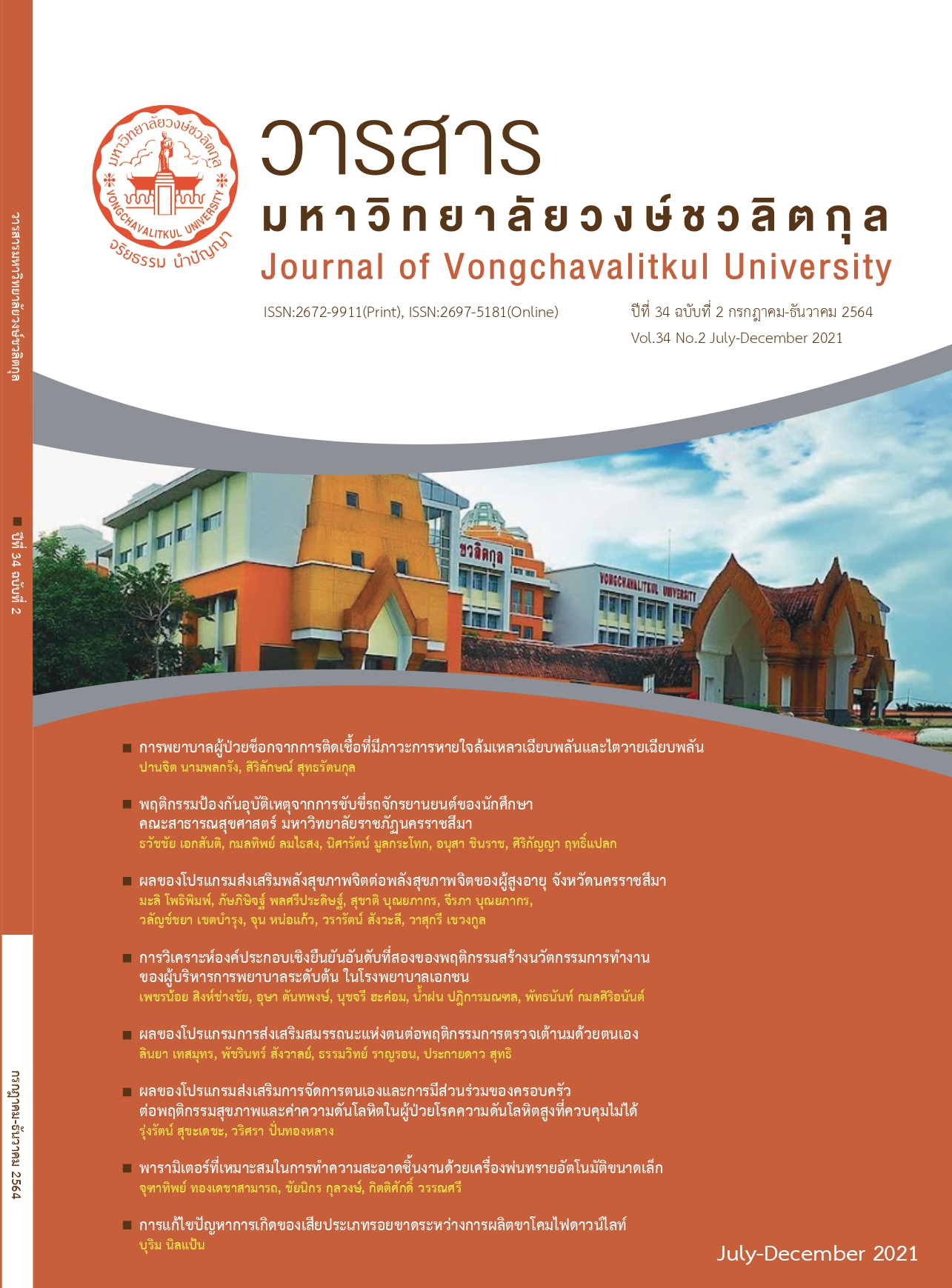The Effects of Self-Management Program and Family Participation Enhancing on Health Behaviors and Blood Pressure in Patients with Uncontrolled Hypertension
Main Article Content
Abstract
Objective: This study aimed to compare the health behavior scores and blood pressure values of patients with uncontrolled hypertension in the experimental group before and after receiving the self-management program and family participation, and to compare the patient's health behavior scores and blood pressure values between the group receiving the program and the group receiving standard nursing care. Methods: This study was a quasi-experimental research. Samples were 70 patients with uncontrolled hypertension in Chokchai district, Nakhonratchasima province, selected by matched pair method with similarities in gender, age, and blood pressure level. Samples in experimental group and the control group were 35 participants equivalent. Collected data by using the questionnaire with the content validity index of 0.90. The reliability testing was Cronbach's alpha coefficient of 0.82. Program duration was 8 weeks and 3 times follow-up. Data were analyzed by using statistics included mean ( ) standard deviation (S.D.), paired t-test and independent t-test.
Results: The research findings included; 1) the mean scores of health behavior of hypertensive patients in the experimental group after received the program higher than before received the program and significantly at the level 0.05. 2) Blood pressure values of hypertensive patients in the experimental group after received the program has a lower value than before received the program and significantly at the level 0.05. 3) Blood pressure values of hypertensive patients in the in the group received the program has a lower value than the group received standard nursing care and significantly at the level 0.05. 4) The mean scores of health behavior of hypertensive patients in the group received the program higher than the group received standard nursing care and significantly at the level 0.05. This research finding can be used to promote health behaviors of hypertensive patients.
Article Details
References
กรมควบคุมโรค สำนักโรคไม่ติดต่อ กระทรวงสาธารณสุข. (2563). จำนวนและอัตราป่วยโรค NCDs พ.ศ. 2559 – 2562. ค้นเมื่อ วันที่ 15 กันยายน 2564 จาก http://thaincd.com/2016/mission/ do cuments-detail.php?id= 13893&tid= 32&gid=1-020.
ขนิษฐา สารีพล และปทมา สุริต. (2558). ผลของโปรแกรมการจัดการตนเองต่อพฤติกรรมสุขภาพและระดับความดันโลหิตในผู้ป่วยความดันโลหิตสูงชนิดไมทราบสาเหตุ. วารสารการพยาบาลและการดูแลสุขภาพ, 33(3), 110 -116.
จันทร์เพ็ญ หวานคำ, ชดช้อย วัฒนะ และศิริพร ขัมภลิขิต. (2558). ผลของโปรแกรมการจัดการตนเองต่อพฤติกรรมการควบคุมโรคความดันโลหิตสูงและค่าเฉลี่ยความดันหลอดเลือดแดงของผู้ที่เป็นโรคความดันโลหิตสูง. พยาบาลสาร, 42(1), 49-60.
ชดช้อย วัฒนะ, จงรักษ์ ศุภกิจเจริญ, ณฐวรรณ รักวงศ์ประยูร และปริญญา แร่ทอง. (2558). ผลของโปรแกรมการส่งเสริมสมรรถนะการจัดการตนเองเพื่อควบคุมโรคต่อพฤติกรรมการควบคุมโรคระดับความดันโลหิต และคุณภาพชีวิตของผู้เป็นโรคความดันโลหิตสูงใน
การศึกษาระยะยาว. วารสารวิทยาลัยพยาบาลพระปกเกล้า จันทบุรี, 26(3), 72-89.
ชลการ ยินดี. (2557). ผลของโปรแกรมส่งเสริมการจัดการตนเองและการมีส่วนร่วมของครอบครัวต่อพฤติกรรมสุขภาพและค่าความดันโลหิตของผู้สูงอายุโรคความดันโลหิตสูง. วิทยานิพนธ์หลักสูตรปริญญาพยาบาลศาสตรมหาบัณฑิต (การพยาบาลผู้ใหญ่) มหาวิทยาลัยสงขลานครินทร์.
ชัยยา นรเดชานันท์, เพชรีย์ กุณาละสิริ และณัฐกวี ศิริรัตน์. (2563). ผลของโปรแกรมการจัดการตนเองโดยการมีส่วนร่วมของครอบครัวต่อการรับรู้ความสามารถของตนพฤติกรรมการดำเนินชีวิตอย่างมีสุขภาวะและระดับความดันโลหิตของผู้ป่วยความดันโลหิตสูง. วารสารการพยาบาลและสุขภาพ, 14(2), 138-151.
ณรงค์ศักดิ์ หนูสอน. (2553). การส่งเสริมสุขภาพในชุมชนแนวคิดและการปฏิบัติ. กรุงเทพฯ: โรงพิมพ์แห่งจุฬาลงกรณ์มหาวิทยาลัย.
นุจรี อ่อนสีน้อย, ยุวดี ลีลัคนาวีระ และชนัญชิดา ดุษฎี ทูลศิริ. (2560). ปัจจัยทำนายพฤติกรรมการป้องกันความดันโลหิตสูงในกลุ่มประชาชนที่มีภาวะก่อนเป็นโรคความดันโลหิตสูง. วารสารพยาบาลสงขลานครินทร์, 37(1), 63-74.
พนิดา จันทร์ดีแก้วสกุล, นันทิยา วัฒายุ และนันทวัน สุวรรณรูป. (2561). ปัจจัยทำนายพฤติกรรมการจัดการตนเองของผู้ป่วยความดันโลหิตสูงชนิดไม่ทราบสาเหตุที่ควบคุมไม่ได้. Journal of Nursing Science, 36(1), 31-43.
เพ็ญศิริ สิริกุล, ชัยลิขิต สร้อยเพชรเกษม และเสริม ทัดศรี. (2553). การพัฒนารูปแบบกิจกรรมส่งเสริมความสามารถในการดูแลสุขภาพตนเองของผู้ป่วยโรคความดันโลหิตสูง. วารสารมหาวิทยาลัยนราธิวาสราชนครินทร์, 2(3), 34 - 48.
รุ่งทิวา ขันธมูล, สมจิต แดนสีแก้ว. (2560). การจัดการตนเองของผู้ป่วยความดันโลหิตสูงที่ควบคุมความดันโลหิตไม่ได้. วารสารการพยาบาลและการดูแลสุขภาพ, 35(2), 89-97.
วริศรา ปั่นทองหลาง, ปานจิต นามพลกรัง และวินัฐ ดวงแสนจันทร์. (2561). ปัจจัยที่มีอิทธิพลต่อพฤติกรรมสุขภาพของผู้ป่วย
โรคความดันโลหิตสูงที่ควบคุมไม่ได้. วารสารพยาบาลสงขลานครินทร์, 38(4), 152-165.
วรัฏฐรินีย์ ธนเศรษฐ. (2561). ผลของโปรแกรมส่งเสริมการจัดการตนเองและการมีส่วนร่วมของครอบครัวต่อพฤติกรรมสุขภาพและความดันโลหิตของกล่มผู้ป่วยโรคความดันโลหิตสูงวัยทำงาน. วารสารวิชาการ สคร, 24(2). 100-111.
สมาคมความดันโลหิตสูงแห่งประเทศไทย. (2562). แนวทางการรักษาโรคความดันโลหิตสูง ในเวชปฏิบัติทั่วไป พ.ศ. 2562. เชียงใหม่: ทริค ธิงค์.
สายพิณ เกษมกิจวัฒนา, และปิยะภรณ์ ไพรสนธิ์. (2557). ญาติ ผู้ดูแลผู้ป่วยเรื้อรัง : กลุ่มเสี่ยงที่ไม่ควรมองข้าม. วารสารสภาการพยาบาล, 29(4), 22-31.
สำนักโรคไม่ติดต่อ กรมควบคุมโรค กระทรวงสาธารณสุข. (2560). แผนยุทธศาสตร์การป้องกันและควบคุมโรคไม่ติดต่อระดับชาติ 5 ปี (พ.ศ. 2560 - 2564). กรุงเทพฯ: อิโมชั่น อาร์ต.
อุไรวรรณ ชัยชนะวิโรจน์ และนิรนาท วิทยโชคกิติคุณ. (2558). พฤติกรรมการใช้ยาในผู้สูงอายุไทย. วารสารการพยาบาลและสุขภาพ, 9(1), 32-46.
Carey, R. M., Muntner P., Bosworth H. B. and Whelton P. K. (2018). Prevention and Control of Hypertension: JACC Health Promotion. Journal of the American College of Cardiology, 72(11), 1278–1293.
Creer, T. L. (2000). Self-management of chronic illness. California: Academic Press.
Flack, J. M., and Adekola, B. (2020). Blood pressure and the new ACC/AHA hypertension guidelines. Trends in Cardiovascular Medicine, 30(3), 160-164.
Kanfer, F. H., and Gaelick-Buys, L. (1991). Self-management methods. In F. Kanfer and A. Goldtein (Eds.),
Helping people change: A text book of methods (4th Ed.). (pp. 305-360). New York: Pergamonpress.
Li, J. D., An, W. S., Xu, Y., Zhao, X. X., Li, Z. F., Mu, Y., and et al. (2018). Mechanism of vasoactive peptide intermedin in vascular collagen remodeling during angiotensin II-induced hypertention. European review for medical and pharmacological sciences. 22(17), 5652-5658.
Joint National Committee 8. (2014). 2014 Evidence-Based Guideline for the Management of High Blood Pressure in Adults. JAMA, 311(5), 507-520.
Long, K. M., Linh, B. P., Adler, A. J., Shellaby, J. T., Aerts, A., Guire, H. M. and et al. (2020). Effect of community-based intervention on self-management of blood pressure among hypertensive adults: findings from the Communities for Healthy Hearts Quasi-experimental Study in Vietnam. Journal of Global Health Science, 2(1), 1-14.
Pender, N. J., Murdaugh, C. L. and Parsons, M.,A. (2011). Health Promotion in Nursing Practicen (6th ed.). Boston, MA: Pearson.
Polit, D. F. and Hungler, B. P. (1987). Nursing research: Principles and methods (3rd ed.) Philadelphia: Lippincott.
Sutipan, P., Intarakamhang, U., Kittipichai, W. and Macaskill, A. (2018). Effects of Self-management Program on Healthy Lifestyle Behaviors among Elderly with Hypertension. The Journal of Behavioral Science, 13(2), 38-50.
Unger, T., Borghi, C., Charchar, F., Khan, A. N., Poulter, R. N., Prabhakaran, D. and et al. (2020). 2020 International Society of Hypertension Global Hypertension Practice Guidelines. Hypertension, 75(1), 1334-1357.
Williams, A. R., Wilson-Genderson, M., & Thomson, M. D. (2021). A cross-sectional analysis of associations
between lifestyle advice and behavior changes in patients with hypertension or diabetes: NHANES 2015-2018. Preventive medicine, 145, 106426.
World Health Organization. (2020). Hypertension. Retrieved September 19, 2021. From https://www.who.int/news-room/fact-sheets/detail/ hypertension.
World Hypertension Day 2020. (2020). Background information on high blood pressure (hypertension). Retrieved September 19, 2021. From https://publichealthupdate.com/world-hypertension-day-2020/
World Hypertension League. (2020). Healthy Blood Pressure Healthy Heart Beat (Brochure). Retrieved September 19, 2021. From http://www.worldhypertensionleague.org/Documents/WHD/๒๐๑๒/WHD%๒๐๒๐๑๒%๒๐brochure.pdf.


